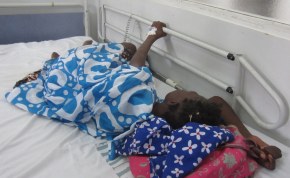By: Danielle L. Gwozdz
Impunity Watch News Reporter, Africa
DAKAR, Senegal – Human Rights Watch has released a report stating that thousands of patients in Senegal suffer from excruciating pain every year without any type of relief. The reason is due to unnecessarily restrictive government regulations and poor training for healthcare workers, which impede their effective medical treatment.

Patients are in need of pain relief to reduce suffering from prolonged illnesses, like cancer, but only a few hundred have access to medications, such as morphine.
Human Rights Watch says each year 70,000 people need this pain relief and that Senegal needs to integrate palliative care measures into its regular health care system.
This came from HRW’s 85-page report titled, “Abandoned in Agony: Cancer and the Struggle for Pain Treatment in Senegal.”
Morphine is an essential and inexpensive medication for treatment of severe pain, but Senegal only imports about one kilogram of morphine each year – enough to treat only 200 cancer patients. HRW also found that morphine is unavailable outside of Dakar, Senegal’s capital.
Frequent shortages limit access to the medication in the capital as well.
The reports also explain that an estimated 80 percent of patients with advanced HIV suffer from moderate to severe pain throughout the course of their illness.
Worldwide, the World Health Organization (WHO) claims that approximately 80 percent of people have no or insufficient access to treatment for such pain.
“Many thousands of cancer patients and other Senegalese suffer unnecessary agony because they can’t get morphine to treat their pain,” said Angela Chung, health and human rights fellow at Human Rights Watch.
“Senegalese officials should ask themselves whether they would want their own parents or children – or themselves – to suffer such pain when there is a cheap and effective way to relieve it.”
The Worldwide Palliative Care Alliance says the situation is particularly bad in sub-Saharan Arica, where only six countries – South Africa, Kenya, Tanzania, Uganda, Rwanda, and Swaziland – have made palliative care programs part of their national health plans.
“Palliative care in Senegal, and a lot of sub-Saharan countries in general, is very poorly developed because it’s not seen as a priority,” Chung said. “I think people might erroneously assume that cancer is something you get in a developed country, but it’s actually a huge problem in Africa and it’s increasing every year.”
People suffering from disease must often travel as much as 10 to 15 hours just for some pain relief.
HRW interviewed more than 170 patients, family members, medical personnel, and officials about the problem. Many patients, however, said they were in too much pain even to be interviewed.
“I am in pain 24 hours a day,” said a 47-year-old man in Dakar who has prostate cancer and suffers during morphine shortages.
“You cannot believe the pain I have all over my body. It is in my bones. I cannot have a real life without my medication. I try to bear the pain for 2 or 3 days, and when I cannot handle it I will take one pill . . . I went to all the pharmacies and they do not sell it.”
For more information, please visit:
Human Rights Watch – Senegal: Thousands Urgently Need Pain Relief – 24 October 2013
Tolerance – Senegal: Thousands Urgently Need Pain Relief – 24 October 2013
Leuk Senegal – Senegal: Thousands Urgently Need Pain Relief – 70,000 a Year Suffer Torment for Lack of Treatment – 25 October 2013
RSS Pump News – Senegal – Thousands Urgently Need Pain Relief – 70000 a Year Suffer Torment – 24 October 2013
My Legal Right – Senegal: Thousands Urgently Need Pain Relief – 24 October 2013
allAfrica – Senegal: Rights Group Presses for Chronic Pain Care in Senegal – 25 October 2013